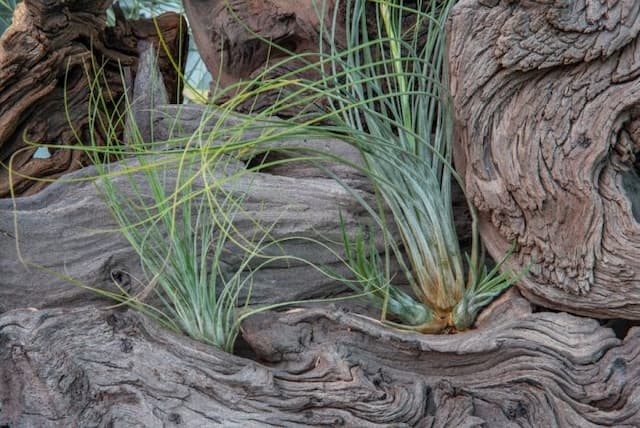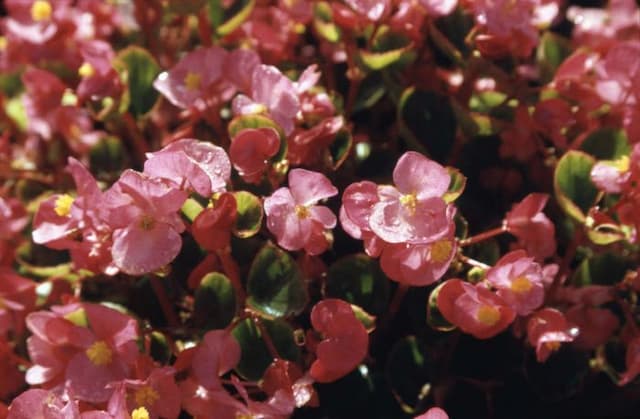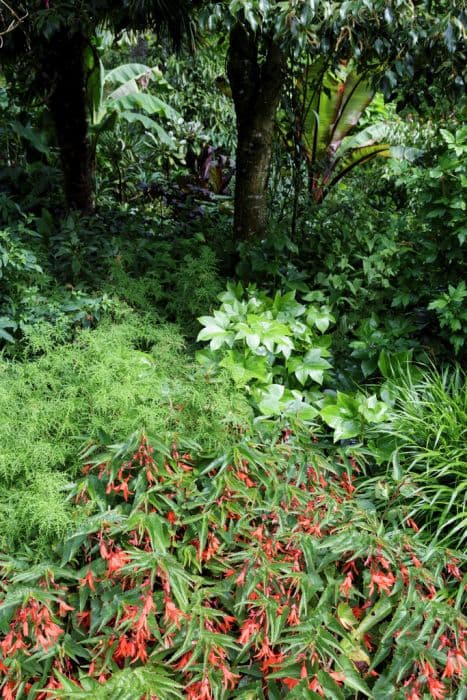Black Knight Begonia Begonia 'Black Knight' (R)

ABOUT
Begonia 'Black Knight' is distinguished by its bold and dramatic foliage. The leaves are a deep, dark shade verging on black, providing a striking contrast to more traditional greenery in a garden or indoor plant collection. Each leaf displays a unique combination of shapes and textures, with some showcasing serrated or wavy edges and a glossy finish that catches the light. The undersides of the leaves often exhibit a reddish-purple hue, further adding to their allure. During its blooming season, the Begonia 'Black Knight' produces blooms that stand out against the dark leaves. The flowers can range in color from pinks to whites, with each cluster creating a delicate and eye-catching display. The overall appearance of 'Black Knight' is lush and tropical, with its richly colored foliage often being the center of attention in any plant arrangement. It's a highly sought-after variety for its unique aesthetic appeal and its ability to create depth and interest in various plant settings.
About this plant
 Names
NamesSynonyms
Black Knight Begonia, Begonia 'Black Knight'.
Common names
Begonia 'Black Knight'
 Toxicity
ToxicityTo humans
The Black Knight Begonia is not highly toxic to humans, but it can cause irritation. If ingested, it may result in symptoms such as nausea, vomiting, and salivation. Additionally, contact with the sap may cause skin irritation or rash. It is advisable to keep this plant out of reach of children to prevent accidental ingestion.
To pets
The Black Knight Begonia is considered mildly toxic to pets, particularly cats and dogs. If a pet ingests parts of this plant, they might experience symptoms like vomiting, salivation, and difficulty swallowing due to the irritant compounds found in the plant's tissues. In some cases, contact with the sap may also cause skin irritation. It is recommended to keep this plant away from pets to avoid these adverse effects.
 Characteristics
CharacteristicsLife cycle
Perennials
Foliage type
Evergreen
Color of leaves
Dark
Flower color
Pink
Height
1-2 feet (30-60 cm)
Spread
1-2 feet (30-60 cm)
Plant type
Herb
Hardiness zones
10
Native area
Tropical South America
Benefits
 General Benefits
General Benefits- Attractive Foliage: The Begonia 'Black Knight' has striking dark leaves which can add contrast and a touch of drama to any garden or indoor setting.
- Easy to Grow: This variety of begonia is relatively easy to care for, making it suitable for both experienced gardeners and beginners.
- Drought Tolerant: Once established, it can tolerate periods of dryness, which can be beneficial in areas with water restrictions or for gardeners who prefer low-maintenance plants.
- Pest Resistant: It's generally resistant to pests, thus reducing the need for chemical treatments and fostering a healthier environment.
- Continuous Blooming: The Begonia 'Black Knight' produces flowers during its blooming season, which adds a pop of color to its surroundings.
- Versatile Plant: Can be grown both indoors and outdoors (in appropriate climates), as well as in containers, hanging baskets, or directly in the garden.
- Non-Invasive: This plant tends not to be aggressive or invasive, allowing it to fit well into a variety of garden designs without overtaking other plants.
 Medical Properties
Medical PropertiesThis plant is not used for medical purposes.
 Air-purifying Qualities
Air-purifying QualitiesThis plant is not specifically known for air purifying qualities.
 Other Uses
Other Uses- Begonia 'Black Knight' can be used in container gardens for its striking dark foliage which contrasts well with lighter colored plants.
- They can serve as terrarium plants due to their compact growth habit and preference for high humidity levels.
- The leaves of the begonia can be used in craft projects, like leaf casting, to create decorative patterns or textures.
- In photography, the unique appearance of the Begonia 'Black Knight' adds an interesting element to plant-focused still life compositions.
- They can act as a natural privacy screen when planted closely together in a small garden or balcony space.
- Use as a seasonal decoration during Halloween because of its dark foliage, lending a 'spooky' aesthetic to arrangements or displays.
- As a living gift, especially for plant collectors or enthusiasts who appreciate its unusual dark coloring.
- Begonia 'Black Knight' can be used in education to teach about varietal breeding and traits selection in horticulture.
- Leaves can be used as a natural dye for fabric or paper, resulting in unique shades depending on the mordant used.
- It can be showcased in botanical art due to its ornamental appeal and distinctive color for a dramatic effect.
Interesting Facts
 Feng Shui
Feng ShuiThe Black Knight Begonia is not used in Feng Shui practice.
 Zodiac Sign Compitability
Zodiac Sign CompitabilityThe Black Knight Begonia is not used in astrology practice.
 Plant Symbolism
Plant Symbolism- Caution: Begonias are often associated with warning or caution due to their two-toned leaves, which can signify the need to stay alert or heed a warning
- Bewilderment: The complex patterns and dark foliage of the 'Black Knight' variety specifically can evoke feelings of confusion or complexity
- Uniqueness: Its distinctive dark leaves and rarity can symbolize individuality and the celebration of being different
- Dark beauty: The 'Black Knight' cultivar, with its deep coloration, may represent the appreciation of beauty that is unconventional or outside the norm
 Water
WaterThe Black Knight Begonia should be watered regularly to keep its soil consistently moist but not saturated. It's important not to let the plant sit in water as this can lead to root rot. Generally, water this Begonia when the top inch of soil feels dry to the touch, which may equate to watering once a week, but this can vary depending on the environment and the size of the pot. A moderate amount, like about 8-16 ounces for a medium-sized pot, is usually sufficient. During the winter months, reduce watering as the plant enters a dormancy period and its growth slows down.
 Light
LightBlack Knight Begonia thrives in bright, indirect sunlight. Direct, harsh sunlight can scorch its leaves, while too little light can cause the plant to become leggy and affect its rich foliage color. A spot near an east or north-facing window where it can receive plenty of diffused light is ideal. If natural light is insufficient, supplement with grow lights to maintain vibrant leaf coloration and overall plant health.
 Temperature
TemperatureThe ideal temperature range for Black Knight Begonia is between 60°F and 75°F. They can tolerate a minimum temperature of around 50°F, but cold drafts and temperatures below this can be damaging to the plant. They should not be exposed to temperatures above 86°F as excessive heat can stress the plant. Keeping Begonias in a consistent temperature range without fluctuations is key to their health.
 Pruning
PruningPruning Black Knight Begonia helps maintain its shape, encourage bushier growth, and remove any dead or yellowing leaves. Pruning is best done in the spring or early summer when the plant is beginning a period of active growth. Remove spent blooms and trim back leggy stems to encourage more compact growth. Generally, light pruning can be done throughout the growing season to keep the plant looking its best.
 Cleaning
CleaningAs needed
 Soil
SoilThe best soil mix for Black Knight Begonia is a well-draining, peat-based potting mix with added perlite or vermiculite. The ideal soil pH should be slightly acidic to neutral, ranging from 5.5 to 6.5.
 Repotting
RepottingBlack Knight Begonias should be repotted every 1-2 years or when they outgrow their current pots, ideally in spring or early summer.
 Humidity & Misting
Humidity & MistingBlack Knight Begonia thrives in high humidity, preferably around 50-70%, which can be achieved by using a humidifier or placing the pot on a tray filled with pebbles and water.
 Suitable locations
Suitable locationsIndoor
Place in bright, indirect light and maintain high humidity.
Outdoor
Provide shade, shelter from wind, and consistent moisture.
Hardiness zone
10-11 USDA
 Life cycle
Life cycleThe Begonia 'Black Knight' begins its life cycle as a seed or from a cutting. Once germinated or rooted, the seedling grows into a juvenile plant with distinct dark, almost black foliage. As it matures, the plant develops a strong stem and lush leaves, entering its vegetative stage. During this stage, the plant focuses on leaf and stem growth. Eventually, the Begonia 'Black Knight' reaches sexual maturity and produces flowers, typically during the warmer months. After pollination, the plant produces seed capsules, and once these capsules ripen, the seeds are dispersed, starting the next generation.
 Propogation
PropogationPropogation time
Spring-Early Summer
The most popular method of propagating the Begonia 'Black Knight' is through leaf cuttings. This can be done at any time of the year but is most successful when performed in spring or early summer when the plant is actively growing. To propagate by leaf cuttings, select a healthy mature leaf and cut it into pieces, each section having at least one of the main veins. Dip the cut edge of the leaf piece into rooting hormone powder to encourage root growth. Then, lay the leaf sections onto a well-draining potting mix, barely covering the cut edge with the soil. Maintain the humidity around the cuttings by covering them with a plastic bag or placing them in a propagator and keep in indirect light until new plants begin to grow from the veins, which typically occurs within several weeks. After new growth is established, individual young plants can be carefully separated and potted up.

![Begonia [Allure]](/_next/image?url=https%3A%2F%2Fplants-admin.emdemapps.com%2Fimages%2Fplants%2F%2Fimages%2F604b5b9006ab9.png&w=640&q=75)







